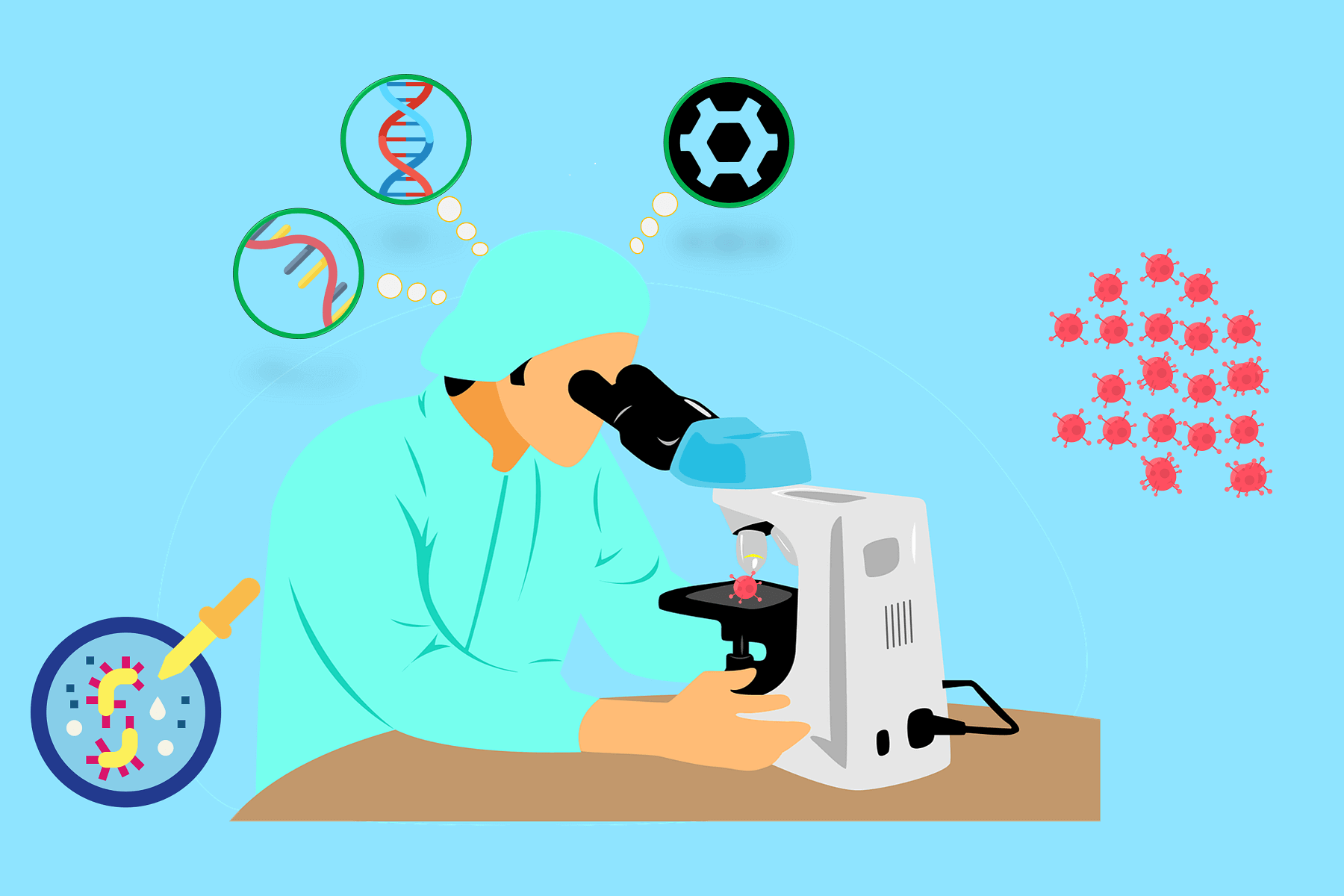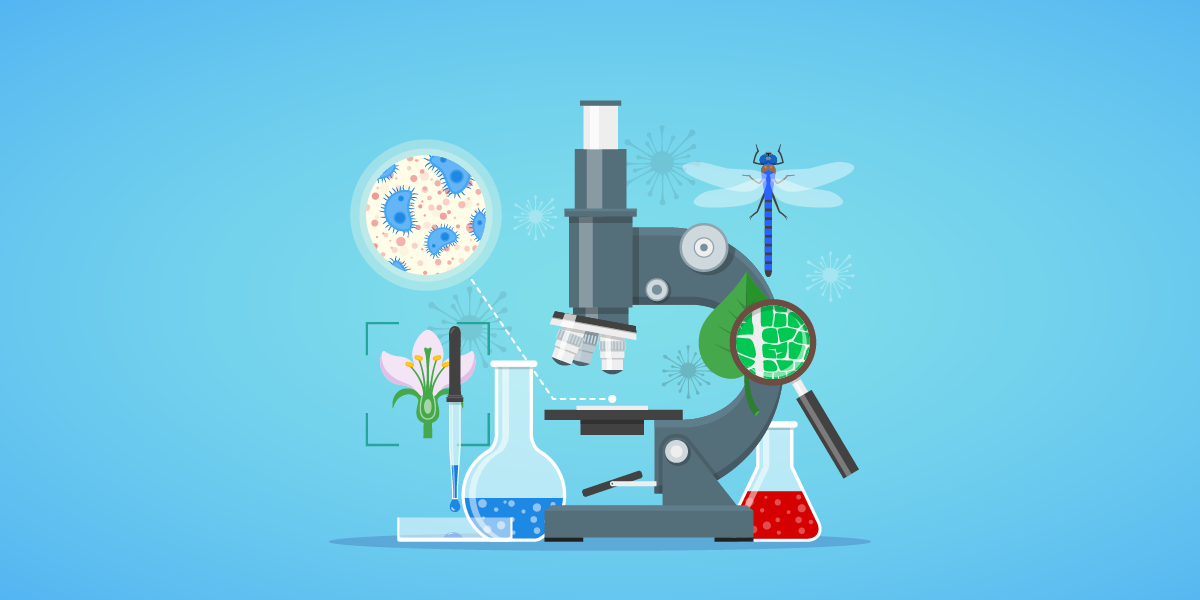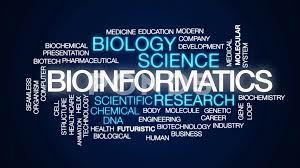Mon-Sat 9am-7pm



















A molecular biologist uses several scientific techniques while carrying out his or her daily work routine. He or she applies standard molecular biological techniques such as the process of cloning, ligation, PCR, gel electrophoresis, primer, DNA sequence analysis and several other complex scientific techniques.
A molecular biologist’s work responsibility also includes manufacturing research-grade materials. They may be responsible for creating several B2B products used for clinical purposes such as manufacturing IVD products, IVD stands for in vitro diagnostic products. They are instruments or systems that are used for diagnosing several diseases.
A molecular biologist generally works with a team of people. They must have the skill to prepare data presentations which are made for purposes like a scientific meeting or a meeting with the stakeholders. There can be several reasons behind conducting a presentation. It could be either done to start a new project or to show the progress of the existing one.
A molecular biologist spends his or her most of the time in designing and analysis of DNA construct. A molecular biologist aims at finding DNA relationships between several living organisms therefore he or she is involved in research to understand and find any similarities or patterns.
A molecular biologist uses software in order to construct DNA and molecular modeling of living organisms. On a daily basis a molecular biologist interacts with several digital tools which can make his or her work easier.
Science keeps evolving as time passes. Therefore, to keep up with several scientific advancements taking place around the globe a molecular biologist keeps reviewing scientific literature and journal articles. It is important to know about the changes going on in the field to cope up with the competition.
There are certain quality standards that are pre-decided in the field of molecular biology. Therefore, a molecular biologist holds the responsibility of quality control while he or she is carrying out a lab experiment or conducting a study for analyses.
Several studies and experiments are conducted by a molecular biologist on a daily basis. A molecular biologist is responsible for preparing reports from the findings of the studies, researches and experiments conducted and presents it in the scientific meetings or in a meeting with the stakeholders.

01Step
Most of the students do not know how to become a molecular biologist after 10th. Well, we have answers to your all the career related queries. The first step for pursuing a career as a molecular biologist is successful completion of 10+2 in physics, chemistry and biology with minimum 50 per cent marks.
02Step
Students often get confused about a molecular biologist career path. As they do not know how to become a molecular biologist after 12th.
Several colleges conduct entrance exams to provide. In order to be eligible to sit for the entrance exam, students must have appeared in 10+2 examination. The admission is provided on the basis of evaluation of students' performance in the entrance examination. Several other colleges and institutes provides admission on a basis of a 10+2 passing percentage. We have mentioned below major entrance examinations that provide students support to enroll in a full time degree programme to establish a career as a molecular biologist.
Major Entrance Examinations
| IPU CET | BHU UET |
| JMI EE | AMU EE |
| SRMJEEE | VITEEE |
| BIT SAT | CUET |
03Step
In order to pursue a career as a molecular biologist one needs to complete his bachelors course. Some bachelors courses that aid the individual in becoming a molecular biologist are
Major Bachelor's Degree Programmes
B.Sc. and B.Tech. are the preferred undergraduate degree for Molecular Biologist career.
04Step
Once a bachelor's degree is completed, students have several options to lead a molecular biologist career path. We have mentioned below major two options to establish a successful career as Molecular Biologist.
Option 1: Candidates can start working in the industry at an entry-level position after the successful completion of a bachelor's degree. After acquiring an experience of few years, they can further opt for a master's degree programme in a biochemistry or related specialisation to progress in the career as a molecular biologist.
Option 2: Candidates after successful completion of a bachelor's degree can opt for a master's degree programme without any gap in the academic year. Further, they can start working in the industry in an entry-level role. We have mentioned below major master's degree programmes to establish a career as a molecular biologist.
Major Master's Degree Programmes
M.Sc. and M.Tech. are preferred postgraduate Molecular Biologist courses.
|
M.Tech in Biotechnology |
|
|
M.Tech in Pharmaceutical Technology |
|
If one wants to study after masters there are Ph.D. programmes available as well if that suits the students' requirements he or she can go for them as well.
Employment Nature
Contractual
Monthly Salaries
Research associates plan, organize, and conduct research on businesses, markets, investments, or the economy. They are employed by asset management firms, financial institutions, consulting firms, and in-house research departments of companies. The responsibilities of research associates can vary depending on the size and needs of the firm.
The basic pay for research associates is 25,000 INR per month. An entry-level research associate is expected to receive a total compensation of 25,000 INR per month. After gaining experience in the field, their salary increases up to 45,000 INR per month.
Employment Nature
Contractual/Permanent
Monthly Salaries
A Junior Molecular Biologist is a professional who conducts research and experiments at molecular level to better comprehend the function of molecules and understand how they react when put in different environments. A Junior Molecular Biologist may occasionally troubleshoot minor breakdowns in the laboratory instruments, perform preventative maintenance and ask technicians for repairs.
The salary of Junior Molecular Biologist varies from organisation to organisation. The average Junior Molecular Biologist salary in India is Rs. 500,000 per annum.
Employment Nature
Contractual/Permanent
Monthly Salaries
A Senior Molecular Biologist is responsible for identifying, designing, implementing and managing the molecular biology experiments. He or she documents the study and its findings. A Senior Molecular Biologist is required to prepare report and presentations for internal and external use.
The salary of Senior Molecular Biologist varies depending on skills, expertise and other things. The average salary of Senior Molecular Biologist is Rs. 900000 per annum.
| PROS |
|---|
| Suitable for people who likes to solve problems mentally |
| Suitable for people who wants independence and likes to work on their own and make decisions |
| This career is perfect for people who love to work indoors. |
| Very high salary (top 25% highest paid careers) |
| CONS |
|---|
| Not suitable for people who likes to start and carry out projects |
| It is very hard to get into this career. Extensive skill, knowledge, and experience is required for this career. |
| Demand for this career is not growing |
| Long working hours (More than 40 hours per week) |
Molecular biologists can use critical thinking skills to draw conclusions from their research. Critical thinking skills help draw an unbiased evaluation of the conclusions. The required skills to improve your critical thinking skills are:
Open-mindedness: Keeping an open mind towards what the conclusion can be after you complete an experiment is important because a predetermined conclusion might not be the most optimal solution. In that case, being open to taking different approaches can be helpful.
Self-regulation: Self-regulation involves monitoring yourself and changing the way you think so that you can gather multiple perspectives by yourself.
Analytical skills can help scientists design experiments and efficiently evaluate data at work. Analytical skills may help divide a bigger problem into multiple smaller problems. There are three important parts that you can focus on:
Interpretation: There are multiple ways in which you can understand a problem. The more perspectives there are at the problem the easier it may be to reach an optimal solution.
Inferences: These are conclusions you can reach from each of the interpretations that you had drawn.
Evaluation: This includes comparing the inferences with numeric results.
A molecular biologist can use verbal communication skills to communicate with other scientists in a lab and written communication skills to write reports on their research. Writing reports and collaborating with other scientists can be important aspects of your job as a molecular biologist. The ability to communicate your ideas and experiments through reports and scientific papers may be critical.
Molecular biologists can use problem-solving skills to address issues that arise during experiments. Many deviations from the theoretical steps can occur during the experiment. In these situations, it is critical to move the experiment forward by quickly deriving a solution to the problem at hand.
Scientists use deductive reasoning to apply the steps of the scientific method to their research. You can use logical reasoning to deduce more conclusions by looking at the previous conclusions. You can draw different indirect conclusions from the same experiment using deductive reasoning. Syllogisms are well-known forms of deductive reasoning that you can practise to improve your deductive reasoning abilities.
Call us at +91 9205084085, Monday - Friday, 9 am - 7 pm


